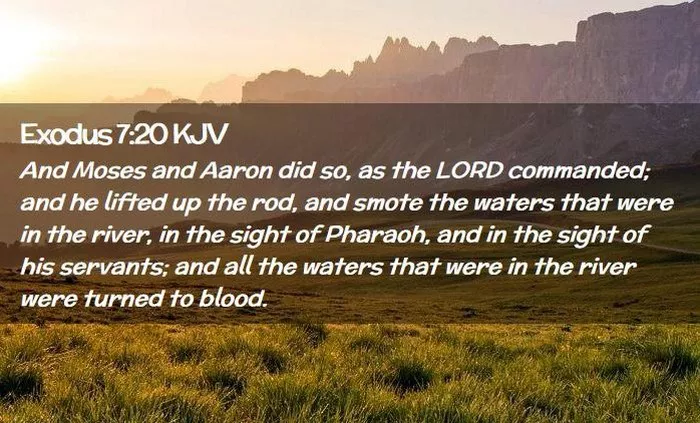Read the Daily Bible Verse – Exodus 7:20 To Strengthen Your Spiritual Journey.
Exodus 7:20 (KJV) reads: “And Moses and Aaron did so, as the Lord commanded; and he lifted up the rod, and smote the waters that were in the river, in the sight of Pharaoh, and in the sight of his servants; and all the waters that were in the river were turned to blood.”
This verse describes the first act of divine judgment—the turning of the Nile River’s waters into blood. It marks a pivotal moment in the Exodus narrative, highlighting God’s sovereignty, justice, and commitment to His promises.
The Context on Exodus 7:20 KJV
Immediate Context
Exodus 7:20 occurs after God instructs Moses and Aaron to confront Pharaoh with a sign of His power. The Nile River, a vital lifeline for Egypt, is struck by Aaron’s rod at God’s command. This act fulfills the warning God issued in Exodus 7:17, demonstrating His authority and the consequences of Pharaoh’s defiance.
Broader Context
This event is the first of the ten plagues, which escalate in severity as Pharaoh’s heart remains hardened. The plagues are not arbitrary punishments but calculated judgments against Egypt’s oppression of the Israelites and its idolatrous worship of false gods, particularly those associated with the Nile, such as Hapi, the god of fertility and the Nile.
The Exodus 7:20 Meaning
Exodus 7:20 emphasizes obedience, divine power, and the execution of God’s judgment.
Moses and Aaron’s Obedience
The phrase “Moses and Aaron did so, as the Lord commanded” underscores the importance of faithful obedience to God’s instructions. Their actions serve as a model for believers, demonstrating that obedience to God is integral to fulfilling His purposes.
God’s Sovereignty Over Nature
By turning the Nile into blood, God displays His power over creation, challenging Pharaoh’s perceived authority and exposing the impotence of Egypt’s deities. This act is a direct confrontation with the Egyptian belief system, where the Nile was seen as a source of life and divine blessing.
The Consequences of Defiance
The turning of the Nile into blood signifies the consequences of Pharaoh’s rebellion. This act of judgment disrupts daily life in Egypt, affecting drinking water, agriculture, and commerce, showing that defiance against God has tangible repercussions.
Exodus 7:20 Application in Life
The lessons from Exodus 7:20 remain deeply relevant for believers today.
Faithful Obedience
Moses and Aaron’s example reminds us of the importance of trusting and obeying God, even when His instructions seem daunting or incomprehensible. Their faithfulness led to the manifestation of God’s power and purpose.
Acknowledging God’s Authority
The plague serves as a stark reminder of God’s ultimate control over all aspects of life. In a world that often elevates human ingenuity or natural forces, Exodus 7:20 calls believers to recognize God as the supreme authority.
The Cost of Rebellion
Pharaoh’s defiance of God resulted in suffering for himself and his people. This passage warns against the dangers of pride and resistance to God’s will, encouraging humility and repentance.
Comparison with Other Biblical Texts
Exodus 7:20 aligns with several other Scriptures that emphasize God’s power, judgment, and the importance of obedience.
Genesis 1:3
“And God said, Let there be light: and there was light.”
Just as God spoke creation into existence, His commands in Exodus demonstrate His authority to control and alter nature according to His will.
Psalm 78:43-44
“How he had wrought his signs in Egypt, and his wonders in the field of Zoan: And had turned their rivers into blood; and their floods, that they could not drink.”
This psalm recounts God’s miraculous works in Egypt, highlighting His justice and faithfulness to His people.
Revelation 8:8
“And the second angel sounded, and as it were a great mountain burning with fire was cast into the sea: and the third part of the sea became blood.”
The plague in Exodus foreshadows similar judgments in Revelation, connecting God’s acts of justice across Scripture.
Modern-Day Relevance
Exodus 7:20 speaks to contemporary issues and challenges, offering timeless principles for believers.
A Call to Submission
Just as Pharaoh was called to submit to God’s authority, modern individuals are reminded of the importance of surrendering to God in every aspect of life, including governance, community, and personal decision-making.
Recognizing False Idols
The Nile was central to Egypt’s prosperity and worship, symbolizing dependence on creation rather than the Creator. This verse challenges believers to examine their own lives for modern-day idols, such as wealth, technology, or power, and to place their trust in God.
Environmental Stewardship
The transformation of the Nile into blood highlights the impact of sin and rebellion on the environment. It calls believers to consider their role as stewards of God’s creation, ensuring that natural resources are used responsibly and reverently.
Conclusion
Exodus 7:20 is a profound testament to God’s sovereignty, justice, and faithfulness. It challenges readers to reflect on their own obedience, humility, and recognition of God’s authority.
In a world that often values human achievement and self-reliance, this passage calls believers to trust in God’s power and submit to His will. By studying and applying the lessons of Exodus 7:20, we can grow in faith, live obediently, and experience the fullness of God’s purposes in our lives.
Exodus 7:20 Commentary
Scholars and theologians provide valuable insights into the theological and symbolic dimensions of Exodus 7:20.
A Clash of Powers
Many commentators view the plague as a direct confrontation between the God of Israel and the gods of Egypt. By striking the Nile, God asserts His supremacy over Egypt’s primary deity and its entire religious system.
A Test of Faith
Moses and Aaron’s actions demonstrate their trust in God’s promises and commands. Their obedience, despite potential fear or doubt, reflects the faith required to partner with God in His redemptive work.
The Hardening of Pharaoh’s Heart
Pharaoh’s refusal to repent, despite witnessing God’s power, highlights the dangers of spiritual blindness and pride. This theme recurs throughout the plagues, illustrating the consequences of resisting God.
Related Topics:


